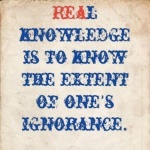Technology: rights or responsibilities?
By Dr. Andy Farnell
Introduction
I've been wondering why I enjoy occasionally writing things for the Techrights site? What does "tech rights" mean to me? Where does my philosophy touch on "digital rights"? Are there even such things as digital rights or might that idea actually subtract from more fundamental human rights? If they exist, where do they come from? Who claims them? Who defends them? And most of all - since I firmly believe that all rights are accompanied by duties - what are the obligations that people have toward technology?
The nub of this windy essay is that while the Free Software movement has changed the world, its effect is largely "internal". It has been more about the developers and project founders who make software than the users of software.
That's because we frame things in terms of "rights". Despite the fact that all of us are now beneficiaries of Software Freedom, most people do not recognise the ideals undergirding the code that runs the world. We experience it only as packaged (Tivoised) proprietary produce much the way that consumers of processed food from supermarkets are disconnected from farmers.
I've recently read upsetting comments about the progress of Libre software as a social movement. Alexandre Oliva took some flack for his LibrePlanet 2024 talk. Though the response was clumsy and rude, the frustration expressed by people struggling to survive in techno-authoritarian regimes is not without merit and behoves reflection. As the crimes of mass surveillance and dehumanisation through technology grow, we seem at a loss to explain the failure of humans to steer digital technology, either by democracy or markets, and the failure of "rights and freedom" alone to offer a credible counter to our plight.
My suggestion is that we need to turn this around and re-frame the problem in terms of responsibilities. Rights always come with them. Technology already offers us so much freedom. Maybe too much? Squandering great opportunity for unity and peace we've mostly used it to spread hate and fear, and amuse ourselves to death. Shouldn't we examine this? If digital technology as a whole were a single program we would be furiously typing at the debugger by now.
Next we want to use it to kill art and culture in the name of "efficiency" and in vainglory of our golden calf of the week, "AI". Libre software (and any connected movement for digital rights) is thus drunk on the same wine as Capitalism. But what is wrong with Capitalism, tree of all the fruits we relish?
Someone recently asked me, "am I anti-capitalist?". With serious and sincere thought I had to say "No. I'm just anti-asshole". With further reflection it's not even that, since my friends who would happily call themselves Capitalists are anything but. So I go back to what I think is the most incisive comment I've ever read about Capitalism since Marx, and it's by a psychologist and psychotherapist Adam Phillips, who says:
"Capitalism is for children"
I hope we are able to read that in a non-threatening and non-judgemental way just for a moment. For children?
Having children really changes your perspective on life. You get to see, rather than experience, the transition from helplessness to earned security and self-dependency. Becoming "responsible" rather than being a jangling bag of nerves, confused and dependent, with no patience or situational awareness of time or space, is an epic milestone. Some of us take longer to get there. Not all of us get there.
We find, perhaps not by accident, that the kind of technology capitalism begets and the influence of that technology on culture, does feel a little bit like that of a child. As climate change is forcing us to confront that and rapidly grow-up with respect to energy tech, I think smartphones, AI and social media are similarly provoking a crisis of maturity around communications technology.
Thinking about our responsibilities is an escape from the frustration of childhood. We have to face, viz Sartre, the burden of condemnation to be free. Free to make anything and everything we like of digital technology, including all that we mustn't. Or in Snowden's words, "Just because we can, doesn't mean we should". Peter-Pan Capitalism, and its lust for ubiquity, immediacy, omnipresence, omnipotence, omniscience, absolute safety and unqualified freedom, will not serve us in navigating a world we've furnished with adult technology like atom bombs, AI and mind control networks.
And since digital technology is built by we the people a more mature relation with it might also adjust our relation to needs and resources, government, intelligence, the law, police, health, education, religion and all the other things we need other than a facsimile of social-connection and entertainment.
For those opposing tyranny and ignorance it may provide us with weapons we had never dreamed of in the fight against corrupt and lazy creeds like "surveillance capitalism" which trades in our dignity, and corporate "enshitification" that preys on our gullibility.













